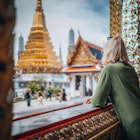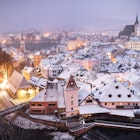

Boats on Inle Lake. Sean Hsu / Shutterstock
In the unique watery world of Inle Lake, Intha fisherman row canoes with one leg, gardens float, and wooden homes perch above the water on rickety stilts. Take some time to explore one of Myanmar's most iconic destinations with an early-morning cruise, a cycle through the countryside, or sojourns into the surrounding hills and villages.
Take a boat trip
Getting out onto the water is naturally the most popular way to experience Inle Lake. Every morning a flotilla of slender wooden canoes fitted with long-tailed outboard motors surges forth, transporting visitors to various natural, cultural, religious and historic sites. , on the northern edge of the lake, is the base for setting out on motorboat trips т every hotel and guesthouse in town can help arrange one, or just wait for a boat captain to approach you in the street.

Trips can be tailored, but tours typically include visits to the famous sights in the northern part of the lake, such as in Tha Ley, the in Nga Phe village, and the floating gardens. Make sure to spend time observing the Intha fishermen (most photogenic at dawn) and their unique technique of rowing the boat with one leg while using both hands to fish. Other destinations further afield include villages , Hmaw Be, and Samkar, and you can also include a visit to , where crumbing, hilltop pagodas look down on the water.

A standard day trip costs K15,000 to K18,000 (US$12 to US$15); or K20,000 with Inthein. The fee covers the entire boat; drivers will carry up to five passengers, who get padded seats and life jackets. Many trips start at dawn, when the light is great for photos. During the day it gets very hot: bring a hat, water and plenty of sunscreen. Sunset trips are also popular, although note it can get chilly on the lake. Most boats provide blankets but you may want a jacket or a wrap.

DIY cycling tour
Inle is not only about the water. It's also possible to explore the perimeter by bicycle and take in some beautiful Burmese countryside. Many sights are clustered around the lake, including hot springs and small villages.
Begin in Nyaungshwe, where bikes can be hired for around K1500 (US$1.50) per day. Peddle west along an unpaved, bumpy road through farmland. Take a left at the T-junction and head south, following the mountains. After about 8km you will reach the Khaung Daing hot springs, where the water is piped into a series of swimming pools. A soak here costs adults US$7, or US$10 for a dip in a private pool.
Continue pedalling south until you reach Khaung Daing, an Intha village producing Shan Stateтs famous tofu. Shan tofu is made with split yellow pea flour, mixed with boiling and then poured into a mould to set. Thin tofu wafers are set out to dry, and you can enjoy a tofu thoke (tofu salad) for a few hundred kyat.
After lunch, hire a boat for K8000 (US$6.50) to ferry you and your bike across the lake. Youтll be deposited on the eastern side, where you can continue cycling north through sugar cane plantations and small villages.
As you near the north side of the lake you will see Red Mountain Estate winery to the east. Head up the hill for a magnificent view of Inle and the vineyards (you can also taste the wine for K3000). Continue around the north side of the lake, and head into Nyaungshwe before sunset as the roads are not lit.

Journey beyond the lake
Itтs well worth taking a day or two to travel beyond Inleтs most easily accessible sights, or to visit one of the region's villages on market day.
, about an hour from Nyaungshwe by pick-up truck, is the administrative capital of Shan State, with a number of historic churches and Burmese-style mosques, and a night market selling cheap-and-cheerful local treats.
Taunggyi is also one of the locations for a rustic market that rotates among about a dozen towns in the Inle Lake region. The market happens every five days (except when there's a full moon), drawing minorities down from the hills to trade livestock and produce. Other market towns include , near Nyaungshwe; , at the southern end of the lake; Pindaya, home of the Shwe Oo Min Natural Cave Pagoda; and , where the market is popular for its sheer size and photogenic setting. Hotels and guesthouses can advise you where the market will be heading next.

Further afield (and also on the market circuit), about three hours by pick-up from the lake, is , a former hill station surrounded by Buddhist pagodas, hilltop viewpoints and the peaceful villages of the Palaung, Danu, Pa-O, Taung Yo and Danaw peoples. Set in a gorgeous landscape of forest-capped hills, Kalaw is a top trekking destination, and the starting point for two- to four-day hikes all the way to Inle. Many restaurants in Kalaw serve food with distinctive Nepali and Indian flavours, thanks to the labourers who came to build the railroad during British rule.
Make it happen

The jumping-off point for Inle Lake is Nyaungshwe, but the town has no bus terminal or airport. If travelling to Inle Lake by air, you'll need to fly to Heho, about an hour away by car (taxis charge K25,000 т US$20 т from the airport). If arriving by land, take any bus bound for Taunggyi and hop off in Shwenyaung, the junction leading to Nyaungshwe, from where thoun bein (tuk-tuk) drivers can take you the remaining 10km.
There is a compulsory K12,500 (US$10) fee to enter the Inle Lake area, which you must pay on arrival at the permit booth located by the bridge at the entrance to Nyaungshwe. Tickets are valid for one week, although you're unlikely to be asked to pay again if you stay longer.
This article was updated by David Eimer in September 2016
Explore related stories


 BeachesThese 5 day trips from Sydney will show you the splendors of New South Wales
BeachesThese 5 day trips from Sydney will show you the splendors of New South WalesNov 22, 2024 тЂ 7 min read

 Destination PracticalitiesA first-time guide to the Grand Egyptian Museum
Destination PracticalitiesA first-time guide to the Grand Egyptian MuseumNov 22, 2024 тЂ 8 min read
 Festivals & EventsChristmas dinners around the world: choose your favorite festive dishes
Festivals & EventsChristmas dinners around the world: choose your favorite festive dishesNov 22, 2024 тЂ 5 min read

 Destination PracticalitiesDo you need a visa to visit Thailand? Hereтs everything to know
Destination PracticalitiesDo you need a visa to visit Thailand? Hereтs everything to knowNov 22, 2024 тЂ 8 min read


